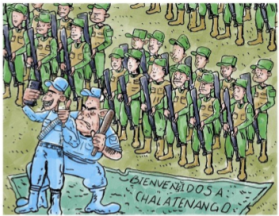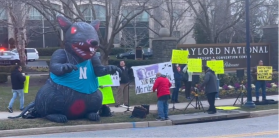Informal Sector Vendors Protest CAFTA Reforms
On Tuesday vendors of pirated DVDs and CDs protested the reforms to intellectual property law in El Salvador for criminalizing their source of employment. The changes to the law are part of the larger constitutional reforms that the U.S. has demanded from El Salvador in order to be in compliance for CAFTA. The protestors shut down streets in downtown San Salvador. A vendor representative said that by signing CAFTA the government "wanted to please the gringos but not Salvadoran informal vendors, to whom they give no alternatives."
On December 14th the same right-wing parties that pushed CAFTA through last year voted for substantial legal reforms to the country's domestic laws without previous research or debate. In response, the members of the FMLN fraction - all of whom walked out of the assembly in protest to the vote - decided that their deputies on the board of the National Assembly should take the full ten days allowed for review before signing the reforms and sending them off for presidential sanction.
El Salvador's ARENA-led government immediately blamed the FMLN for the delay in CAFTA's implementation, originally scheduled for January 1st 2006. However, even if FMLN members of the Assembly board had immediately signed the reforms, several subsequent legal steps remained in order for El Salvador to obtain US certification of CAFTA compliance. Furthermore, there are two sets of rules and regulations for agricultural import quotas that the U.S. now wants changed in their agreement with El Salvador. In late December, when it was clear that none of the countries were prepared to implement CAFTA, the USTR declared that the agreement would take effect on a piecemeal basis, as countries implement the required reforms. The Salvadoran government, who has led the race to implement the reforms, is now aiming for a start date of February 1st.
Instead of admitting that the changes to El Salvador's domestic laws, forced by the US, should have been presented, studied, and debated several months before the looming January 1st deadline, ARENA attacked the FMLN for the setback. "The delay is a political whim of the FMLN who completely opposes employment", said Salvadoran President, Antonio Saca. Meanwhile, one of El Salvador's main newspapers published articles claiming that the postponement would cost the private sector and the country 18 million dollars. ARENA's effort to make El Salvador the first country to implement CAFTA was such that it sent the reforms to the OAS - the last legal step in the process - on December 23rd. Also, a government delegation visited Washington the last week of December to supposedly lobby the USTR.
In light of March's legislative and municipal elections, ARENA is attempting to appear responsive to the population's main criticisms of the administration, particularly the economic crisis. ARENA has presented CAFTA as the solution to the country's economic crisis, even though the population does not believe that CAFTA will be beneficial.

 "I am a CISPES supporter because continuing to fight for social justice and a more people-centered country means continuing the dream and sacrifice of thousands of my fellow Salvadorans who died for that vision.” - Padre Carlos, New York City
"I am a CISPES supporter because continuing to fight for social justice and a more people-centered country means continuing the dream and sacrifice of thousands of my fellow Salvadorans who died for that vision.” - Padre Carlos, New York City

